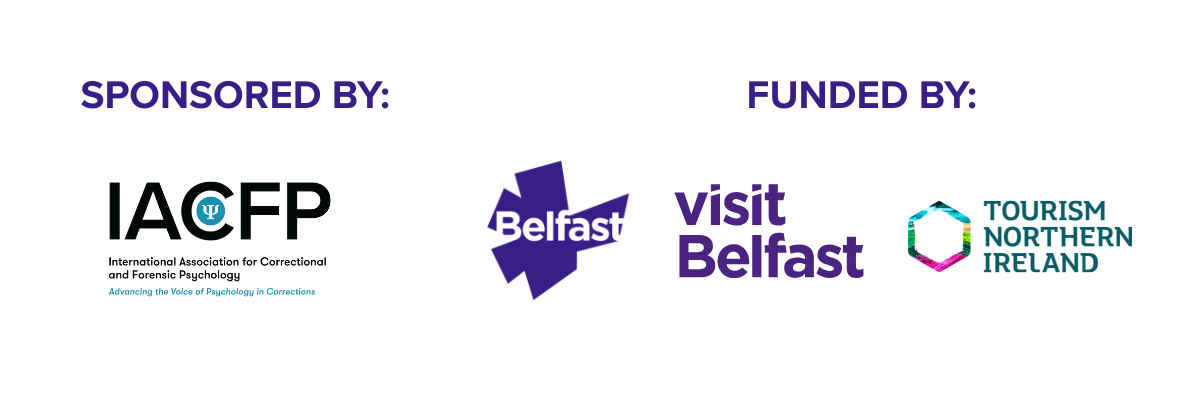- You are here:
- Homepage
- Events
- Past Events
- Correctional Research Symposium 2025
- Programme

Registration and Badge Collection
Registration
Registration and Badge Collection
3pm – 5.30pm BST, 13 May 2025 ‐ 2 hours 30 mins
Registration
test
Plenary
test
8.30am – 8.40am BST, 14 May 2025 ‐ 10 mins
Plenary

This presentation defines wellbeing and discusses the barriers to wellbeing created by the system itself, as well as the barriers created by the unresolved trauma of individuals. Practical tips are explored to promote wellbeing for both staff and residents, and how to implement the three levels of trauma work: trauma informed, trauma responsive, and trauma specific.
The voices of those with lived experience will also be shared as we are challenged to understand the impact of the environment on behavior and to rethink the structure of corrections.
ICPA / EuroPris Welcome and Introduction
Plenary
ICPA / EuroPris Welcome and Introduction
8.50am – 9.10am BST, 14 May 2025 ‐ 20 mins
Plenary
Speakers




Northern Ireland Welcome and Introduction
Plenary
Northern Ireland Welcome and Introduction
9.10am – 9.20am BST, 14 May 2025 ‐ 10 mins
Plenary
Global Track Chair Introduction
Plenary
Global Track Chair Introduction
9.20am – 9.30am BST, 14 May 2025 ‐ 10 mins
Plenary
Speakers

The "How to Improve" the Psychology of Criminal Conduct and Risk-Need-Responsivity Frameworks in Improving Corrections (PID004)
Plenary
The "How to Improve" the Psychology of Criminal Conduct and Risk-Need-Responsivity Frameworks in Improving Corrections (PID004)
9.30am – 10.30am BST, 14 May 2025 ‐ 1 hour
Plenary
Speakers

Coffee Break
Coffee Break
Coffee Break
10.30am – 11am BST, 14 May 2025 ‐ 30 mins
Coffee Break
Violence risk screening in prison practice, is it feasible and does it work? Results from a national study in The Netherlands (PID050)
Parallel Workshops
Violence risk screening in prison practice, is it feasible and does it work? Results from a national study in The Netherlands (PID050)
11am – 11.30am BST, 14 May 2025 ‐ 30 mins
Parallel Workshops
In many correctional and supervision settings for adults and youth the use of comprehensive violence risk assessment is simply not feasible for all individuals due to restraints in funding, staffing, training or time. To offer more simplified and feasible risk evaluation opportunities, in recent years novel risk screening methods have been developed. These can be used to guide risk management in prison practice, to aid in prison leave decision making, to assist community reintegration, and to support adult or youth supervision. Two examples will be presented: the Risk Screener Violence for Prison practice (RS-V) and Risk Screener Youth for juvenile and young adult violence and criminality (RS-Y). Experiences will be shared from the recent nationwide implementation of the RS-V across all adult prisons in The Netherlands. In particular, results will be presented from a 5 year national study across 25 Dutch prisons, demonstrating predictive validity for prison violence, as well as community violence after discharge. In addition, results from a multi-site study with the RS-Y in youth settings will also be shared, including the additional self-assessment version. Moreover, multi-year user-experience inquiries with the RS-V and RS-Y will be highlighted. Finally, advantages and disadvantages of risk screening will be discussed and the potential broader international application of the RS-V and RS-Y will be contemplated.Speakers

Dr. Michiel De Vries Robbé
Senior Researcher, Amsterdam University Medical Center, Netherlands
Young Men, Vulnerability, and Imprisonment (PID079)
Parallel Workshops
Young Men, Vulnerability, and Imprisonment (PID079)
11am – 11.30am BST, 14 May 2025 ‐ 30 mins
Parallel Workshops
This paper seeks to expose and dissect the emotional underbelly of the highly macho young male prisoner society. It discusses how imprisoned young men of all types inner (and sometimes public) lives were dominated by feelings of vulnerability and their inability to cope with the rigours of imprisonment. While a range of sources of vulnerability affected young men in Hydebank, this paper will focus on three primary sources that were discussed most frequently by the young men themselves: physical and mental health; self-harm, including suicide; and medical and illicit drugs.
Speakers

Dr Conor Murray
Senior Lecturer in Criminology and Criminal Justice, Ulster University, Ireland
The Implementation of Evidence-Based Practices in the French Rehabilitation and Probation Services: A Critical but Overlooked Process (PID028)
Parallel Workshops
The Implementation of Evidence-Based Practices in the French Rehabilitation and Probation Services: A Critical but Overlooked Process (PID028)
11am – 11.45am BST, 14 May 2025 ‐ 45 mins
Parallel Workshops
This presentation explores the implementation of Evidence-Based Practices (EBP) within the French rehabilitation and probation services (SPIP) through the lens of the "Operational Practices Handbook" (RPO1), published in 2018. The RPO1 introduces the Risk-Need-Responsivity (RNR) model, aiming to professionalise and harmonise probation officers' practices. However, the integration of this model into existing practices rooted in social and educational work raises concerns regarding its political, scientific, and professional implications. Using a mixed-methods approach, including 181 questionnaires and 42 semi-structured interviews with directors, probation officers, and psychologists from seven SPIPs, this research examines how the implementation has been carried out, its effects on practitioners, and the barriers and levers encountered. Findings reveal that while EBP are seen as an opportunity for professional growth, it can cause negative effects with insufficient consultation and guidance. The study emphasises the need for adaptability, flexibility, and support during the implementation process and calls for correctional administrations to bridge the gap between theoretical models and practical realities, valuing probation officers' experiential knowledge alongside scientific research.Speakers

Anaïs Tschanz PhD
Researcher, French National School of Prison Administration (ÉNAP), France
An Organisational Response to Supporting the Complex Needs of Violent and Disruptive Prisoners: Key Performance Indicators from the National Violence Reduction Unit (PID068)
Parallel Workshops
An Organisational Response to Supporting the Complex Needs of Violent and Disruptive Prisoners: Key Performance Indicators from the National Violence Reduction Unit (PID068)
11.30am – 12pm BST, 14 May 2025 ‐ 30 mins
Parallel Workshops
The National Violence Reduction Unit (NVRU) is a secure rehabilitative unit in the Midlands Prison, Ireland. Established in November 2018, the Unit was an organisational response to the complex needs of a small number of high risk, violent and disruptive prisoners (VDPs) in the Irish Prison Service (IPS). Joint operational and clinical leads, namely an Assistant Governor and Senior Psychologist, manage and lead the NVRU. A novel feature of the NVRU is the significantly enhanced role of the Psychology Service in the day-to-day running and management of the unit, along with the importance of a trauma-informed culture, which considers the interactions and communication between staff and prisoners.The NVRU has four strategic aims: 1. Reduce repeated serious violent/sexually violent offending; 2. Improve psychological health, well-being and pro-social behaviour of prisoners managed on the unit, while enhancing relational outcomes; 3. Improve competence, confidence and attitudes of staff working with complex prisoners; 4. Introduce higher quality service, increased efficiencies and cost-effectiveness. Evaluating progress towards these aims is the focus of the paper.
We will present descriptive data on Key Performance Indicators (KPIs) for each of the four strategic aims.
Descriptive statistics will support analysis of progress towards strategic aims, with comparisons made to previous trends in unit performance.
Discussion will focus on performance related to the strategic objectives of the unit, alongside best practice guidelines. We will discuss the key barriers and facilitators to meeting strategic aims. We will draw implications for the future development and improvement of the unit.
Speakers
Dr Gráinne McKenna DClinPsych, MSc, BA (Hons)
Senior Clinical Psychologist/NVRU Co-Lead, Irish Prison Service, Ireland
Recidivism in Norway (PID070)
Parallel Workshops
Recidivism in Norway (PID070)
11.30am – 12pm BST, 14 May 2025 ‐ 30 mins
Parallel Workshops
Speakers

Stian Haugen
Senior adviser, The Directorate of Norwegian Correctional Service, Norway
Atiqur Rahman
Senior adviser, The Directorate of Norwegian Correctional Service, Norway
From Policy to Practice: Enhancing Child-Friendly Juvenile Correctional Training Across Europe (PID086)
Parallel Workshops
From Policy to Practice: Enhancing Child-Friendly Juvenile Correctional Training Across Europe (PID086)
11.30am – 12pm BST, 14 May 2025 ‐ 30 mins
Parallel Workshops
Despite the emphasis on capacity-building in juvenile correctional services by various EU strategies, guidelines and rules, a gap persists between training policy intentions and quality training practices. The ARISA Child research project aimed to bridge this gap by assessing professional training needs and creating a digital training course grounded in Risk-Need-Responsivity, Desistance and Recovery Models.
A comparative training needs research study, employing surveys and qualitative interviews across 10 EU member states, revealed common deficiencies in training for staff working with juveniles. In the first instance, this paper presents the resulting policy recommendations to improve national strategies for training juvenile correctional services staff. Additionally, the paper presents findings from the recent evaluation study assessing the effectiveness of the developed digital staff training course. Initial results, from implementation in five languages, indicate the programme’s success in improving knowledge of child-friendly justice practices among staff.
The ARISA Child research underscores the importance of developing organisational training policies and practices that are informed by both empirical models of rehabilitation and complimented by staff needs, as informed by the lived experience of those working in juvenile correctional settings.
Speakers

Claire Machan
Rehabilitation, Reintegration and Community Portfolio Coordinator, IPS Innovative Prison Systems, Portugal

Evidence Informed Design and Implementation of Offending Behaviour Programmes in His Majesty’s Prison and Probation Service (PID040)
Parallel Workshops
Evidence Informed Design and Implementation of Offending Behaviour Programmes in His Majesty’s Prison and Probation Service (PID040)
11.45am – 12.30pm BST, 14 May 2025 ‐ 45 mins
Parallel Workshops
Join a multidisciplinary team of highly specialised colleagues from His Majesty's Prison and Probation Service (HMPPS) Interventions Services with experience of working in the design and delivery of offending behaviour programmes in HMPPS. This is an opportunity to learn more about the latest HMPPS offending behaviour programme design and delivery. HMPPS rehabilitation interventions embody the synchronisation of evidence-informed programme design with effective implementation to enable strengths based, person centred, needs led rehabilitation delivery in highly complex environments across custody and probation settings within England and Wales. Lessons from implementing and delivering programmes at scale whilst upholding clinical integrity will be explored.Speakers
Sunpreet Kandola
National Specialist Lead, HMPPS Interventions Services, United Kingdom
Cara Cunningham
Senior National Specialist Lead, HMPPS Interventions Services, United Kingdom
Personality Profiles of Persistently Disruptive Offenders in a Singaporean Prison Population (PID051)
Parallel Workshops
Personality Profiles of Persistently Disruptive Offenders in a Singaporean Prison Population (PID051)
12pm – 12.30pm BST, 14 May 2025 ‐ 30 mins
Parallel Workshops
Persistently disruptive offenders usually extract significant resources from the Prison system. They commit more offences that are frequently violent in nature. This quantitative research clarifies the personality trait factors that are elevated amongst the offenders who are known to be the most challenging to manage in our prison system, and seeks to identify main differences between offenders who are persistently disruptive from the mainstream population. Personality traits were assessed using the Personality Assessment Inventory. Implications for the management and treatment of these offenders are discussed including a description of Singapore Prison Service's plans to improve its intervention services for offenders with personality disorders.Speakers

Dr Melvinder Singh Psy.D
Deputy Director, Senior Principal Psychologist, Singapore Prison Service, Singapore
Enhancing Risk Assessment in Corrections: The Critical Role of Acute Dynamic Factors (PID078)
Parallel Workshops
Enhancing Risk Assessment in Corrections: The Critical Role of Acute Dynamic Factors (PID078)
12pm – 12.30pm BST, 14 May 2025 ‐ 30 mins
Parallel Workshops
This presentation will delve into the latest findings on acute dynamic risk factors, emphasizing their importance in predicting imminent antisocial behavior. We will explore how incorporating these factors into risk assessments can enhance the precision of predictions and inform timely interventions. For instance, studies have shown that daily evaluations of acute dynamic risks can significantly improve the accuracy of recidivism predictions, enabling corrections professionals to implement immediate, targeted strategies to mitigate these risks.
Furthermore, we will discuss practical approaches for corrections professionals to integrate the assessment of acute dynamic factors into existing protocols. This includes training on identifying and monitoring these transient risk elements and developing responsive intervention plans that address the immediate needs of individuals under supervision. The discussion will address the assessment of risk for individuals within the prison environment and those in the community.
By understanding and applying knowledge of acute dynamic factors, corrections professionals can proactively manage and reduce the risk of offending, thereby enhancing the effectiveness of rehabilitation efforts and contributing to safer prisons and communities.
Speakers

Professor Melissa Hamilton JD, PhD
Professor of Law & Criminal Justice, University of Surrey, England
Collaborative Justice - A Paradigm for Youth Crime Prevention and Penal Policy Reform (PID091)
Parallel Workshops
Collaborative Justice - A Paradigm for Youth Crime Prevention and Penal Policy Reform (PID091)
12pm – 12.30pm BST, 14 May 2025 ‐ 30 mins
Parallel Workshops
Speakers

Dr Federica Coppola PhD
Assistant Professor of Criminal Law, IE University Law School, Spain

Peer Mentoring in Criminal Justice (PID021)
Plenary
Peer Mentoring in Criminal Justice (PID021)
1.30pm – 2.30pm BST, 14 May 2025 ‐ 1 hour
Plenary
Peer mentoring in criminal justice has exploded internationally in recent decades and has become a core part of the correctional ecosystem in the UK and beyond. This paper will trace a history and international reach of peer practices before presenting empirical findings from England and Scotland. There is evidence that peer mentoring can provide essential supports; promote desistance from crime; and stimulate forms of solidarity and social justice focused action. However, there are also limitations to be considered to ensure this practice is employed safely. Potentials and pitfalls of peer mentoring will be explored, before the practice is located within broader lived experience movements, which have the potential to promote more inclusive, fit for purpose approaches to justice.Speakers

Dr Gillian Buck
Associate Professor of Social Work, Faculty of Health, Medicine and Society, University of Chester, United Kingdom
Coffee Break and Showcases
Coffee Break & Showcases
Coffee Break and Showcases
2.30pm – 3.30pm BST, 14 May 2025 ‐ 1 hour
Coffee Break & Showcases
Dog Days? Developing dog projects for older people in prison (PID022)

Professor Emerita Helen Codd LLB (Hons); MPhil. (Cantab.); MIoL; FRSA
Professor Emerita of Law & Social Justice/ Director, University of Central Lancashire/ Seahorse Criminak Justice, United Kingdom
Cultivating Change: Harnessing Strengths and Lived Experiences to Transform Justice (PID026)

An evaluation of the Tuiscint award in the Training Unit Prison; a case for an achievement award for older learners in our prisons in Ireland (PID095)

Eoin Flood
Head of Education, Mountjoy West Education Centre, Educational Services to Prisons, City of Dublin ETB, Ireland
Anna Boyle
Head of Education, Training Unit Education Centre, Educational Services to Prisons, City of Dublin ETB, Ireland

Maria Ward
Organiser of Education, Educational Services to Prisons, Educational Services to Prisons, City of Dublin ETB, Ireland
Inhouse Harmony A Choir's Journey. The piece outlines the journey an inside/outside choir, women in community and men incarcerated at Mountjoy Prison (PID058)

Caroline Jones
People Engagement Manager, SOLAS (Further Education and Training Authority), Ireland

Prisoner Education: A Hard Cell? (PID023)
James (Jim) King
Independent Consultant, Representing PC-CP, Council of Europe, Scotland
Start360 and Compassion Prison Project, Trauma Talks Programme at HMP Magilligan (PID033)
Reproductive Healthcare in Prisons for Women: Lessons from Qualitative Research in Canada (PID096)

Intervention for people in custody convicted of sexual offences: A snapshot of three group-based programmes facilitated by the Irish Prison Service (IPS) (PID081)
Dr Ken Murphy
Acting Principal Specialist Psychologist, Psychology Service, Irish Prison Service, Ireland

Dr Bernie McEvoy
Senior Counselling Psychologist, Psychology Service, Irish Prison Service, Ireland
Expanding the scope for understanding peer mentoring: implications for women’s prisons (PID006)
Parallel Workshops
Expanding the scope for understanding peer mentoring: implications for women’s prisons (PID006)
3.30pm – 3.52pm BST, 14 May 2025 ‐ 22 mins
Parallel Workshops
This presentation explores the role of peer mentoring in women’s prisons, focusing on its potential to address operational challenges and support incarcerated women. Peer mentors alleviate staff workloads by undertaking practical tasks, fostering communication, and de-escalating conflicts. Their non-authoritative approach enhances prisoner-staff relationships, supporting prison operations in under-resourced environments. However, ethical concerns arise as peer mentors often fill gaps left by systemic issues such as staff shortages, creating blurred boundaries between peer support and institutional labour. The absence of structured supervision exacerbates emotional strain for mentors, highlighting the need for formalised support systems to balance operational benefits with ethical considerations.Speakers

Social participation in the execution of a custodial sentence - volunteer assistance to people who have completed their imprisonment and are in crisis of homelessness (PID031)
Parallel Workshops
Social participation in the execution of a custodial sentence - volunteer assistance to people who have completed their imprisonment and are in crisis of homelessness (PID031)
3.30pm – 3.52pm BST, 14 May 2025 ‐ 22 mins
Parallel Workshops
There is a group of people who, after completing their prison sentence, remain in a crisis of homelessness and end up either on the street or in the care of institutions helping the homeless. In such cases, the return to life at freedom is painful and often the person's further fate depends on complete strangers. A huge role in providing similar help is played by volunteers, organised around non-profit institutions, who are often best placed to provide help and act as a living bridge between society and a person who is doubly marked: by a history of imprisonment, and by remaining in a crisis of homelessness. The presentation will show an ongoing research project on the activities of volunteers organised around non-profit organisations for people who have completed their prison sentence and are in a crisis of homelessness. The aim of the ongoing research is to show how society in the form of volunteers helps a specific group of ex-prisoners in their difficult life situation. The presentation will highlight the biggest challenges in providing such support, and the greatest needs as perceived by both volunteers and beneficiaries of assistance.Speakers
Translating Research into Practice: An Evolution of Looking Forward, Offender Motivational Programme in Singapore (PID037)
Parallel Workshops
Translating Research into Practice: An Evolution of Looking Forward, Offender Motivational Programme in Singapore (PID037)
3.30pm – 3.52pm BST, 14 May 2025 ‐ 22 mins
Parallel Workshops
In this presentation, we will share the journey of adopting evidence-informed practices, from programme design and implementation to evaluation and review, using LF programme as a case study since its inception in 2014. The presentation will illustrate how at the individual and interpersonal level, there is considerable evidence that offenders have improved their motivation to change through frequent engagements and encouragement from officers. This has had a positive impact on their interpersonal relationships with fellow inmates and with their families. The presentation will highlight as well how consistent research and evaluation has informed changes in organisational policy to accelerate the adoption of the LF programme SPS-wide and buttress its impact on creating a rehabilitative culture within the prison ecosystem.
Essentially, the presentation will emphasize how research and evaluation processes have served as a guidepost for the SPS in developing an integrated approach for improving correctional effectiveness that strives to address personal, interpersonal, community and organizational factors. We will also share key lessons learnt to enhance future practice in corrections.
Speakers

April Lin M.A.
Senior Assistant Director, Correctional Research Branch, Singapore Prison Service, Singapore

Vivien Soh
Senior Correctional Rehabilitation Specialist, Programme Design and Implementation Branch, Singapore Prison Service, Singapore
Transformation Through Sport in Prison: Examining the Impact and Psychological Mechanisms of a Football-Based Programme in the UK (PID045)
Parallel Workshops
Transformation Through Sport in Prison: Examining the Impact and Psychological Mechanisms of a Football-Based Programme in the UK (PID045)
3.30pm – 4.15pm BST, 14 May 2025 ‐ 45 mins
Parallel Workshops
Here, we present findings from an ongoing evaluation of the Twinning Project, a football-based intervention delivered in over 70 prisons across England and Wales. Using survey data from 164 male prisoners, we explore how participation fosters social bonding and satisfies important psychological needs. Participation was associated with enhanced self-efficacy and improved life satisfaction, key factors in rehabilitation. The evidenced link between strengthened prosocial identities, psychological need satisfaction, and well-being aligns with the social cure model and emphasises the importance of group-based activities in prison.
Complementing this, interviews with women prisoners revealed both benefits and gender-specific challenges. While women experienced increased confidence and future aspirations, they also faced barriers related to programme structure, health concerns, and post-release uncertainty. Peer and staff support, the appeal of football, and access to non-criminal identities emerged as key enablers.
These findings underscore the need for gender-responsive, group-based sports interventions that strengthen social bonds, improve wellbeing, and support long-term rehabilitation in prison settings.
Speakers

It’s Prisoners Talking to Prisoners’: A Qualitative Exploration of Peer-Led Mental Health Advocacy in Prison (PID043)
Parallel Workshops
It’s Prisoners Talking to Prisoners’: A Qualitative Exploration of Peer-Led Mental Health Advocacy in Prison (PID043)
3.52pm – 4.14pm BST, 14 May 2025 ‐ 22 mins
Parallel Workshops
Despite a large body of research examining the impact of peer led mental health programmes in educational settings, little research has examined this impact in a prison setting. Following the roll of out of peer led mental health workshops in the Irish Prison Service (through the Red Cross Community Health and First Aid Programme), we qualitatively examined the impact of the programme. Our findings highlight the power of peer led initiatives in raising awareness and educating others on mental health. Significant meaning making was reported throughout the experience of the workshop facilitators and workshop attendees. The programme resulted in individuals finding meaning, developing skills, and forming connections within the prison while fostering a shared curiosity and understanding about the impacts and management of mental health.Speakers

Alison O'Dwyer
Assistant Psychologist, Psychology Service, Irish Prison Service, Ireland

The interplay of family relationships and visits in the process of prisoner recidivism (PID027)
Parallel Workshops
The interplay of family relationships and visits in the process of prisoner recidivism (PID027)
3.52pm – 4.14pm BST, 14 May 2025 ‐ 22 mins
Parallel Workshops
Imprisonment damages family ties, and the pains of imprisonment thesis (Sykes, 1958) suggests that the physical separation and emotional trauma of imprisonment place a significant strain on family relationships. A number of studies have shown that the maintenance of social ties and increased family attachment strongly contribute to the development of desistance and thus significantly impact the successful recidivism of offenders (Klein et al., 2002).Between March and May 2024, we conducted a study with colleagues from the National University of Public Service (Miklós Tihanyi Ph.D., Máté Sivadó Ph.D., Márta Fekete Ph.D., and Noémi Baráth) with the permission of the Hungarian Prison Service in Hungary, investigating the influence of family ties on recidivism. In this context, we completed a questionnaire with 224 recidivist prisoners in 5 prisons in Hungary (Tiszalök National Prison; Baracska Unit of the Middle-Transdanubian National Prison; Vác Strict and Medium Regime Prison; Hajdú-Bihar County Remand Prison; Kiskunhalas National Prison).
We hypothesize that the reintegration system, which may work very well within the prison walls, cannot counterbalance the crime-attracting factors in the offenders' family background. The main research question was to investigate which family factors are most likely to reinforce re-offending, whether they can be identified as the most likely to prevent re-offending, and how regular attendance contributes to re-offending. We were curious to find out what correlations can be observed between the family background, financial and living conditions of recidivist prisoners, and the reception of visitors, and in my presentation, I will describe these correlations in detail.
Speakers

The changing interpersonal landscape of correctional centres in New South Wales, Australia: Digital tablets and Five Minute Interventions (FMI) (PID062)
Parallel Workshops
The changing interpersonal landscape of correctional centres in New South Wales, Australia: Digital tablets and Five Minute Interventions (FMI) (PID062)
3.52pm – 4.14pm BST, 14 May 2025 ‐ 22 mins
Parallel Workshops
Recent years have seen major changes to the interpersonal landscape of prisons in NSW. These have included rollout of digital tablets to all people in prison, coinciding with substantial shifts in how they maintain contact with friends and family in the community, in addition to training of all prison staff in the Five Minute Interventions (FMI) suite of relational skills and practices. Drawing on a number of quantitative and qualitative studies, we explore how digital tablets and resulting changes to connectedness with community, as well as FMI, interact to impact upon people's experiences of prison climates and indicators of prosocial change.Speakers

CANCELLED: Inside Stories: Amplifying and surfacing lived experiences of women deprived of liberty (PID061)
Parallel Workshops
CANCELLED: Inside Stories: Amplifying and surfacing lived experiences of women deprived of liberty (PID061)
4.14pm – 4.37pm BST, 14 May 2025 ‐ 23 mins
Parallel Workshops
The presentation focuses on the work of the Commission on Human Rights of the Philippines in amplifying and surfacing the lived experiences of women deprived of liberty. As a National Human Rights Institution, the CHRP monitors places of detention and plays a key role in surfacing lived realities of women facing multiple and intersecting forms of discrimination including elderly, women with disabilities, and lesbian, bisexual, and transgender individuals in detention. The report highlights the human rights issues women deprived of liberty are confronted with – from issues of space, to health, to food, water and sanitation, to gender-specific needs, risks of gender-based violence, traditional gender norms, and access to justice. It includes a discussion on creative sessions conducted to surface women’s hopes and dreams. The presentation also highlights CHRP’s work with detention facilities and community partners in providing focus on the lived experiences of women, call for gendered-responsive and human rights-based approaches, and the use of creative means to surface women’s hopes and well-being.Speakers

Faydah Dumarpa
Commissioner, Commission on Human Rights of the Philippines, Philippines

Krissi Shaffina Twyla Rubin
Attorney IV/Officer in Charge, Center for Gender Equality and Women's Human Rights, Commission on Human Rights of the Philippines, Philippines
Who Helps Offenders Desist? Exploring the Role of Informal Support Networks (PID044)
Parallel Workshops
Who Helps Offenders Desist? Exploring the Role of Informal Support Networks (PID044)
4.14pm – 4.37pm BST, 14 May 2025 ‐ 23 mins
Parallel Workshops
Crime desistance research often focuses on individual agency and formal interventions, yet little attention is given to the role of informal desistance agents—family members, friends, and partners—who provide crucial support during this transition. While theories of social support, differential association, and social learning recognize the influence of social ties, most studies focus on offenders' perspectives, rarely exploring who supports them and how. This research investigates the experiences of informal desistance agents, examining how they become involved, the challenges they face, and their interactions with formal justice actors. Using a qualitative approach, semi-structured interviews are conducted with a diverse sample of informal supporters recruited through community organizations, social media, and referrals from a larger criminological project. Thematic content analysis is applied to identify key patterns in their narratives, such as emotional strain, role ambiguity, personal transformation, and collaboration with formal interventions. By giving a voice to these often-overlooked supporters, this study provides a more comprehensive understanding of crime desistance. The findings aim to refine theoretical models by integrating informal support, inform policies that acknowledge their role, and guide practitioners in fostering collaboration between formal and informal desistance agents. Ultimately, this research highlights the critical role of social support networks in offender rehabilitation and reintegration, emphasizing the need for strategies that extend beyond institutional interventions.Speakers

Enhancing Rehabilitation Outcomes through Prison Staff Training and Development (PID041)
Parallel Workshops
Enhancing Rehabilitation Outcomes through Prison Staff Training and Development (PID041)
4.14pm – 4.37pm BST, 14 May 2025 ‐ 23 mins
Parallel Workshops
- Effective approaches to promoting ongoing staff training and development
Don't miss this opportunity to unlock the potential of prison staff and enhance rehabilitation outcomes.
Speakers


Pivaga Theophile Bani
Prison Superintendent, Victim Offender Prison Care Support (VOPS)/ Ministry of Justice, Cameroon

Maisala Ernest
Judicial Assistant, Victim Offender Prison Care Support (VOPS)/ Ministry of Justice, Cameroon
Creating Connections in Corrections: Leveraging Resident Initiatives to Build International Networks (PID099)
Parallel Workshops
Creating Connections in Corrections: Leveraging Resident Initiatives to Build International Networks (PID099)
4.15pm – 5pm BST, 14 May 2025 ‐ 45 mins
Parallel Workshops
Attendees will hear directly from stakeholders, including Washington Department of Corrections staff, a formerly incarcerated participant, and a University of California, San Francisco (UCSF) expert, who have played a role in developing and implementing Cell-to-Cell (C2C), a virtual exchange program connecting incarcerated individuals and correctional staff in the U.S. with their counterparts in Norwegian prisons.
Developed by a resident advisory council at Stafford Creek Corrections Center in collaboration with Amend at UCSF and the Washington Department of Corrections, C2C fosters mutual learning, peer support, and cross-cultural exchange to counteract the isolating effects of the carceral environment. Over two years, residents and staff in paired U.S. and Norwegian prisons engaged in virtual discussions exploring correctional culture.
Using an implementation science approach, this session examines C2C’s impact on social connection, institutional culture, and system-wide change. Drawing on data from focus groups and semi-structured interviews, this presentation examines C2C’s impact, highlighting its successes, challenges, and considerations for expanding the model across correctional settings.
Speakers

Ginny Oshiro M.A.
Program Manager, Amend, University of California, San Francisco, USA
Kabrina Riley
Women’s Prison Division WA Way Program Manager, Washington State Department of Corrections, USA
Bridging the Gap: The voices and experiences of men in open prisons in England and Wales and their transition towards release (PID104)
Parallel Workshops
Bridging the Gap: The voices and experiences of men in open prisons in England and Wales and their transition towards release (PID104)
4.37pm – 5pm BST, 14 May 2025 ‐ 23 mins
Parallel Workshops
The session will present the research findings from a qualitative study grounded in the voices and lived experiences of men in five open prisons in England. Their views and experiences offer invaluable insights into the opportunities and challenges they face at a critical transition period in their sentence. Men’s accounts indicate reaching open conditions is a critical turning point for them in moving forward and feeling hopeful for the future. The research findings shed much-needed light on the unique role of open prisons and their ongoing efforts to support safe and effective transitions for those in open custodial conditions and how they can effectively bridge the gap between custody and community.Speakers

Family Engagement in European Prisons: Research, Training Gaps, and Innovative Practices (PID056)
Parallel Workshops
Family Engagement in European Prisons: Research, Training Gaps, and Innovative Practices (PID056)
4.37pm – 5pm BST, 14 May 2025 ‐ 23 mins
Parallel Workshops
This presentation explores family engagement in European correctional settings, starting with research from the PROMOTE Centre, which highlights a lack of direct training for prison staff on integrating families into rehabilitation. Findings from 146 interviews across seven countries and survey responses from over 700 practitioners in 10 EU states will be discussed, along with reasons for this gap and potential solutions like interdisciplinary training. Two Bremen-based NGO initiatives will be presented: Game with Mum and Dad, a sports-based program strengthening family ties, and UpFamilies, an app connecting prisoners’ families to local support services. Stakeholder feedback will provide insight into how these initiatives impact relationships and contribute to reintegration efforts, offering practical models for wider implementation. These local initiatives will be contextualised within wider work that Bremen Prison staff are undertaking to recognise that children have the right to see their parents without feeling like they’re serving a sentence too.Speakers


An investigation of job-related factors impacting the stress level and burnout amongst Case Management Officer in the Namibia (PID105)
Parallel Workshops
An investigation of job-related factors impacting the stress level and burnout amongst Case Management Officer in the Namibia (PID105)
4.37pm – 5pm BST, 14 May 2025 ‐ 23 mins
Parallel Workshops
The correctional environment is documented to be inherently stressful, inducing various magnitudes of distress amongst its inhabitants. This phenomenon has been found to extend to correctional officers, who have been reported to experience significant levels of stress, disproportionate to the general public, arising from their job functions, working conditions, and organizational culture (Schwartz, et al., 2023). Consequently, scholars have dedicated considerable efforts to measure the level of stress and burnout among correctional officers and identify the contributing factors thereof (Weston et al 2023).
Speakers

Ndeyapo Emma Nafuka
Director of Rehabilitation, Namibian Correctional Service, Namibia
Structural Measures for Capacity-Problems in the Netherlands (PID066)
Plenary
Structural Measures for Capacity-Problems in the Netherlands (PID066)
8.30am – 9.30am BST, 15 May 2025 ‐ 1 hour
Plenary
Since the fall of 2023, there has been an acute capacity shortage in the Dutch prison system. This shortage is caused, among other things, by an increase in the length of sentences, a sharp increase in the stay in prisons of juveniles and persons who must move on to forensic care and a staff shortage. Although acute and medium-term measures are now being initiated, the Department of Justice and Security has assigned to draft structural measures. The aim of these is to adequately execute imposed sentences in the long term (next 10 years). The execution of sentences is an interplay between the type of sentence (or sanction) and the possibilities to execute them. It is therefore a broad issue in which the entire criminal justice chain plays a role: from the imposition of appropriate sentences, timely execution of sentences, to the prevention of recidivism and working on resocialization. The broad social task underlying this is working towards a safe and just society.Speakers


Antecedents of postprison expectations of prisoners in Switzerland (PID046)
Parallel Workshops
Antecedents of postprison expectations of prisoners in Switzerland (PID046)
9.30am – 9.52am BST, 15 May 2025 ‐ 22 mins
Parallel Workshops
Findings may provide insights into prison policies and rehabilitation programs to foster positive post-release expectations. The results of the study and its practical implications will be discussed with the audience.
Speakers
Ueli Hostettler
Senior Researcher / Professor, University of Bern / Berne University of Teacher Education (PHBern), Switzerland
Process of Desistance and Reintegration: A Longitudinal Study on Parolees and Desistance from Crime (PID029)
Parallel Workshops
Process of Desistance and Reintegration: A Longitudinal Study on Parolees and Desistance from Crime (PID029)
9.30am – 10am BST, 15 May 2025 ‐ 30 mins
Parallel Workshops
Speakers

Viktorie Paloušová
Researcher, Institute for Criminology and Social Prevention, Czech Republic
Beyond One-Size-Fits-All: Gender-Sensitive Approaches in Community Supervision (PID049)
Parallel Workshops
Beyond One-Size-Fits-All: Gender-Sensitive Approaches in Community Supervision (PID049)
9.30am – 10am BST, 15 May 2025 ‐ 30 mins
Parallel Workshops
This presentation explores the integration of gender-sensitive interventions in community supervision practices. It is based on a study conducted with about sixty practitioners working in either the community or correctional sector, supporting women under community supervision, whether on probation or serving a conditional sentence. Some of these practitioners specialize in working with a female clientele, while others work with mixed-gender caseloads, where women represent only a very small fraction of the cases managed.
The findings indicate that while most practitioners recognize significant differences in their interventions with these populations, some remain reluctant to acknowledge that they adjust their practices when working with women. The discussion then focuses on the main obstacles to implementing gender-sensitive practices in this field, including the severe precariousness of justice-involved women, which complicates intervention efforts and limits the support that can be provided beyond meeting their basic needs.
Speakers



Diversion from Ireland’s Main Remand Prison over 20 Years from 2006 to 2025: Navigating Healthcare, Housing & Criminal Justice Systems (PID047)
Parallel Workshops
Diversion from Ireland’s Main Remand Prison over 20 Years from 2006 to 2025: Navigating Healthcare, Housing & Criminal Justice Systems (PID047)
9.30am – 10.15am BST, 15 May 2025 ‐ 45 mins
Parallel Workshops
Diversion may be broadly defined as the transfer of persons with mental illness from the criminal justice system to locations where they may receive appropriate treatment. By early 2024, PICLS had facilitated over 2000 diversions to community inpatient and outpatient settings, as well as to the Central Mental Hospital for persons remanded to Cloverhill Prison. The service has published a series of papers describing clinical outcomes over extended periods since inception in 2006.
2. Prevalence of mental illness in prison settings in Ireland and internationally.
3. Legislative and policy issues in Ireland.
4. Stepped care model for mental health care delivery in Irish prisons.
5. Prison Inreach and Court Liaison Service model of care.
6. Diversion from custody to mental health care: Case vignettes.
7. Research 1: Counting in and counting out male prisoners from Ireland’s main remand prison since 2006: Mental Health Outcomes and “revolving door” patients.
8. Research 2: Forensic admissions over time and other outcomes for persons placed on waiting list for admission from Irish prisons over 5 years.
9. Changes in caseloads in remand prison and in demand from courts over 20 years.
10. Conclusions and Discussion.
Speakers
Conor O'Neill
Consultant Forensic Psychiatrist, National Forensic Mental Health Service, Ireland
Eimear Ní Mhuircheartaigh
Senior Registrar, National Forensic Mental Health Service, Ireland
Culturally Engaged Release for Indigenous Prisoners in Queensland (PID064)
Parallel Workshops
Culturally Engaged Release for Indigenous Prisoners in Queensland (PID064)
9.52am – 10.14am BST, 15 May 2025 ‐ 22 mins
Parallel Workshops
Parole Board Queensland developed the Culturally Engaged Release for Indigenous Prisoners (CERIP) in an attempt to improve outcomes for Indigenous prisoners returning to remote communities by strengthening community support and release plans and increasing motivation for success prior to release. We have done that by establishing relationships with Community Justice Groups including Elders who engage directly with the Board and the parole applicant to help break down barriers to release (such as availability of accommodation) and speak directly to community expectations of the parolee and supports available.
Speakers

Prisoners’ backgrounds and needs: Pathways from assessment, sentence planning, enforcement to post-release integration (PID053)
Parallel Workshops
Prisoners’ backgrounds and needs: Pathways from assessment, sentence planning, enforcement to post-release integration (PID053)
10am – 10.30am BST, 15 May 2025 ‐ 30 mins
Parallel Workshops
An essential prerequisite for effective prison work is to take into account prisoners’ individual needs and backgrounds at different phases of the penalty period - even before and after that (including assessment, enforcement, and release processes). The study examined a relationship between prisoners’ backgrounds and needs in sentence planning and in enforcement of the prison term. Additionally, it explored how needs and backgrounds, sentence planning, and enforcement of penalty to post-release integration are associated.
The study’s results indicate that consideration of the individual needs and backgrounds of prisoners at various stages of the sentence (assessment, enforcement and release phase) remained incomplete. This was particularly evident among short-term prisoners (less than 3 months). In many respects, individual consideration of prisoners' needs and backgrounds was inadequate throughout sentence (including assessment, goals of the sentence plan, prison activities, and preparation for release). Also, some insufficiencies were identified in phases related to gradual release such as transfer from a closed prison to an open prison, backdoor electronic monitoring, and service continuum after release.
Speakers

Navigating Community Supervision: Women's Perspectives on Its Role and Challenges (PID060)
Parallel Workshops
Navigating Community Supervision: Women's Perspectives on Its Role and Challenges (PID060)
10am – 10.30am BST, 15 May 2025 ‐ 30 mins
Parallel Workshops
As more women are placed under correctional supervision worldwide, many receive probation or suspended sentences, intended as alternatives to incarceration that promote social reintegration. However, these measures have faced criticism for leading to increased violations of imposed conditions, which, in turn, overload the judicial and correctional systems by creating new charges, extending supervision, or leading to incarceration for breaches.
Despite this criticism, some research highlights the benefits of community-based measures, such as helping justice-involved women find employment and providing psychosocial support. Yet, scientific knowledge about the strategies used in community supervision, and women’s experiences with it, remains limited.
Based on over 30 qualitative interviews with women under community supervision, the presentation explores the challenges women face in community supervision and their views on its effectiveness, offering insights for improving practices.
Speakers



Early Release from a Custodial Sentence: An Investigation in Italian Prisons (PID088)
Parallel Workshops
Early Release from a Custodial Sentence: An Investigation in Italian Prisons (PID088)
10.14am – 10.37am BST, 15 May 2025 ‐ 23 mins
Parallel Workshops
The investigation aims to find out the reasons why many inmates are serving their sentence inside the prison even though they could be eligible for an alternative measure to detention due to the sentence to be served, or their personal characteristics (drug addiction, seniority). The knowledge, through quantitative and qualitative data, of the reasons that prevent the most vulnerable or socially marginalised subjects from serving their sentence outside prison will be useful for the Administration in its effort to reduce overcrowding, put an end to the violation of the fundamental rights of prisoners and prevent recidivism through the social inclusion of inmates: a good example of useful cooperation between academics and public service administrators and practitioners.Speakers

Claudia Pecorella PhD
Full Professor of Criminal Law, University of Milano-Bicocca, Italy


They All Come Out: Mapping the Desistence Journeys of 150 Prison-Leavers over 18 Months (PID087)
Parallel Workshops
They All Come Out: Mapping the Desistence Journeys of 150 Prison-Leavers over 18 Months (PID087)
10.15am – 11am BST, 15 May 2025 ‐ 45 mins
Parallel Workshops
Through an unprecedented, long-term and large-scale ethnographic study of prison resettlement, this research investigates how dynamic resettlement journeys unfolded over 18-months, to make valuable insights into the mechanisms that contribute to the desistence vs persistence of criminal activity.
Adopting an empirical approach of closeness and immersion, producing thick qualitative description and providing rich, personal accounts capturing how and why behavioral change takes place in the everyday this study presents a micro-scale study of resettlement, and contributes to ongoing theoretical debates about behavioral change more broadly .
Speakers

The Salience of Incarceration History Disclosure and Stigma in Health Service Delivery (PID030)
Parallel Workshops
The Salience of Incarceration History Disclosure and Stigma in Health Service Delivery (PID030)
10.30am – 11am BST, 15 May 2025 ‐ 30 mins
Parallel Workshops
In the United States, the criminal legal system has increased dramatically and is highly unequal. Following release from incarceration, individuals experience rapidly worsening health. One potential explanation for the health consequences of incarceration is stigma, yet little is known about the context and salience of incarceration history disclosure in health service seeking and how the associated stigma of incarceration shapes health service delivery. We conducted interviews with health service providers who had ever treated a patient with a history of incarceration for a sexual or reproductive health concern (n=12) and individuals with a history of incarceration about their experiences seeking and receiving sexual and reproductive care (n=43) and analyzed the transcripts using a general inductive approach. We find that incarceration history disclosures are common and happen indirectly (e.g., appeared in the patient’s chart or the patient was transferred from a correctional facility), or through direct patient disclosure. Patients emphasized that many of their health concerns stemmed from their experiences of incarceration and that they often disclosed their incarceration history despite negative repercussions (such as shorter interactions and less provider concern for their wishes in their care) as they felt the context was necessary for proper treatment. Other times, patients described concealing their history to avoid the negative repercussions when less relevant to treatment or following negative experiences. We find that the stigma of incarceration history in micro-level interactions with health service providers undermines health and reifies social isolation and marginalization for patients with a history of incarceration.Speakers

Women Prisoners' Mental Health: A Multi-stakeholder Perspective (PID094)
Parallel Workshops
Women Prisoners' Mental Health: A Multi-stakeholder Perspective (PID094)
10.30am – 11am BST, 15 May 2025 ‐ 30 mins
Parallel Workshops
The numbers of women being detained in carceral settings has increased by approximately 60% since the year 2000. It is estimated that greater than 80% of these women will experience mental ill-health. There is a general paucity of research focussed on the experiences of women in prison in the context of prison-based mental health care in the empirical literature. The findings from this national study help to make visible these experiences. This study also identifies social and organisational barriers and enablers for the provision of, and for access to, prison-based mental health services from the perspectives of those both women in prison and prison personnel.Speakers

The Size, Scope and Effectiveness of Community Corrections: A Global Review of Research (PID093)
Parallel Workshops
The Size, Scope and Effectiveness of Community Corrections: A Global Review of Research (PID093)
10.37am – 11am BST, 15 May 2025 ‐ 23 mins
Parallel Workshops
This presentation makes a compelling case for the development of a global community corrections data base and resource center that highlights new developments in the area of community corrections within and across global regions. We currently know much more about prison systems in each global region than we do about the community corrections systems in place across the globe. Information on the size, scope, and effectiveness of community corrections systems can be used to drive policy discussions related to how to improve the performance of community corrections, both in terms of efficiency and effectiveness. This presentations highlights recent efforts to estimate the size of the global community corrections population, and to identify high performance community corrections systems ( and programs) in each global region .Speakers

Coffee Break
Coffee Break
Coffee Break
11am – 11.30am BST, 15 May 2025 ‐ 30 mins
Coffee Break
Navigating the Road to Reform: Lessons from Northern Ireland (PID083)
Plenary
Navigating the Road to Reform: Lessons from Northern Ireland (PID083)
11.30am – 12.30pm BST, 15 May 2025 ‐ 1 hour
Plenary
This panel examines the challenges associated with undertaking penal reform from a practice, oversight, academic and lived experience perspective. It does so using a case study of penal transformation in Northern Ireland. More specifically, this session will take an in-depth look at the realities of transforming Hydebank Wood from a Young Offender Institution into the first Secure College in the UK. In this session, the realities of implementing the reforms are discussed, as well as academic research on the mechanisms underpinning the reforms presented. How effective these reforms have been is also investigated from an oversight and lived experience perspective.Speakers


Jacqui Durkin
Chief Inspector of Criminal Justice in Northern Ireland, Criminal Justice Inspection Northern Ireland, United Kingdom

Richard Taylor
Governor In Charge at Hydebank Wood College, Northern Ireland Prison Service, United Kingdom
"You have to be fluid". Prison Officer Types, Perceived Quality of Staff-prisoner Relationships, and Staff Burnout in the Irish Prison Service (PID067)
Parallel Workshops
"You have to be fluid". Prison Officer Types, Perceived Quality of Staff-prisoner Relationships, and Staff Burnout in the Irish Prison Service (PID067)
1.30pm – 2pm BST, 15 May 2025 ‐ 30 mins
Parallel Workshops
This mixed-methods study set out to test the assumption that prison officers can be classified into different prison officer types which shape staff-prisoner interactions and is related to staff burnout. The interview findings indicated that participants felt that prison officer types were applicable to the Irish Prison Service if people were fluid rather than rigid in what type they presented as, which could change depending on a variety of individual and external factors. Second, a novel person-centred latent profile analysis (LPA) of the survey data found quantitative evidence for four classes of prison officers. However, these classes appear more like a continuum of adaption to doing prison work rather than different types of prison officers. Third, the results of the LPA four-class model with covariates and distal outcomes showed statistically significant differences in the perceived quality of staff-prisoner relationships and staff-burnout between the four classes of prison officers, when other potentially confounding variables were controlled for. The findings offer valuable insights into how Irish prison officers can be better supported to achieve the ‘right’ kind of staff-prisoner relationships and reduce burnout.Speakers

Sinéad Meade
Lecturer in Applied Psychology, Dun Laoghaire Institute of Art, Design and Technology, Ireland
Ecosystem Approach to Justice: A Blueprint for Success (PID019)
Parallel Workshops
Ecosystem Approach to Justice: A Blueprint for Success (PID019)
1.30pm – 2pm BST, 15 May 2025 ‐ 30 mins
Parallel Workshops
The European Blueprint of the Correctional Ecosystem underscores the importance of cross-sector collaboration between justice systems and community services to meet societal needs, while preventing over-incarceration and diminishing the burden on community resources. Drawing on concrete examples, the presentation will showcase how countries can learn from each other to create more effective, sustainable and human-centered justice systems.
This work is part of the Erasmus+ RESIZE project (2025–2028): a Blueprint Alliance part of the broader LiberateSkills Pact for Skills (No. 248) initiative, aiming to tackle skills gaps in the correctional ecosystem.
Speakers

Breaking the Silence: A New Model for the Psychological Well-being of Penitentiary Police Officers (PID071)
Parallel Workshops
Breaking the Silence: A New Model for the Psychological Well-being of Penitentiary Police Officers (PID071)
1.30pm – 2.15pm BST, 15 May 2025 ‐ 45 mins
Parallel Workshops
The ‘Psychological Support for the Penitentiary Police Officers’ Project integrates practical experience with academic expertise, introducing a new model based on scientific evidence. This includes an in-depth assessment of needs, a structured intervention for all Italian penitentiary police officers, and rigorous monitoring of results. The goal is to improve psychological well-being, reduce stress, and enhance officers' capacity to handle emergencies and critical situations.
The project is divided into three phases: context analysis, intervention, and monitoring. The first phase assesses the specific challenges faced by officers through focus groups, interviews, and questionnaires. The second phase provides a customized intervention, either individual or group-based, that includes psychoeducation, peri-traumatic interventions, and post-traumatic support such as debriefing and defusing. The final phase involves continuous monitoring and evaluation to assess the effectiveness of the intervention using both quantitative and qualitative measures.
Preliminary results show improvements in psychological well-being, motivation, stress reduction, and team cohesion. The creation of a stable support network within penitentiary institutions has made the model replicable on a national scale. This approach marks a significant innovation in addressing the psychological needs of penitentiary police officers.
Speakers
Elena Nanni
Penitentiary Police Officer, Ministry of Justice - Department of Prison Administration, Italy
Emanuela Mari
Psychologist and Research Fellow, Department of Psychology at Sapienza University of Rome, Italy
Clarissa Cricenti
Psychologist and Research Fellow, Department of Psychology at Sapienza University of Rome, Italy
The role of staff well-being in the capacity and capability of prison staff to deliver trauma-informed care in men’s and women’s prisons in England (PID110)
Parallel Workshops
The role of staff well-being in the capacity and capability of prison staff to deliver trauma-informed care in men’s and women’s prisons in England (PID110)
1.30pm – 2.15pm BST, 15 May 2025 ‐ 45 mins
Parallel Workshops
Speakers

Deirdre MacManus
Consultant and Clinical Reader in Forensic Psychiatry, National Health Service and King's College London, Northern Ireland

Dr Jude Kelman PhD
Directorate Lead Psychologist, Female Estate England, His Majesty's Prison and Probation Service (HMPPS), UK
Trauma and Social Support Experiences of Imprisoned Men in Northern Ireland (PID017)
Parallel Workshops
Trauma and Social Support Experiences of Imprisoned Men in Northern Ireland (PID017)
2pm – 2.30pm BST, 15 May 2025 ‐ 30 mins
Parallel Workshops
Perceived Social support is associated with mental well-being and can ‘buffer’ against the impact of adverse life experiences. Trauma experiences are more common in imprisoned men and therefore further investigation of the relationship between social support and trauma is warranted. A cross-sectional survey and interviews with imprisoned men across the Northern Irish Prison service revealed low levels of social support being experienced by older men and those with a history of substance use. Those with experience of crime related trauma reported lower levels of social support than any other type of trauma. Implications for policy and practice will be discussed.Speakers
Culture change in prisons: Where to start? (PID011)
Parallel Workshops
Culture change in prisons: Where to start? (PID011)
2pm – 2.30pm BST, 15 May 2025 ‐ 30 mins
Parallel Workshops
This presentation will provide an overview of recent research aimed at understanding culture change within prison settings. It will include findings from a study conducted in an English prison that identified the conditions and mechanisms enabling culture change (Fitzalan Howard, Gibson & Wakeling, 2023). Additionally, the presentation will discuss research from two other prisons that employed a Participatory Action Research (PAR) approach to develop prison culture.
Drawing on this research and broader evidence on organisational change and human behaviour, the presentation will offer several evidence-based tips for implementing culture change in prisons.
Speakers

Flora Fitzalan Howard
Managing partner, KTA Research and Consulting LLP, United Kingdom

Help Us, Help Them: Understanding correctional staff responses to organizational policies within institutional and community supervision (PID036)
Parallel Workshops
Help Us, Help Them: Understanding correctional staff responses to organizational policies within institutional and community supervision (PID036)
2.15pm – 3pm BST, 15 May 2025 ‐ 45 mins
Parallel Workshops
This panel includes a distinct focus on correctional culture(s) within custodial (prison/jail) and community (probation/parole/reentry) and the ways organizational polices and practices both create barriers to and facilitators of successful correctional care, custody, and control. The four presentations include empirical data from four of the top scholars in corrections in the U.S. and Canada. The panel will present key findings about staff mental health, wellness, and safety in prisons while including a focus on successful endeavors within community supervision to improve daily practice and thus outcomes. Topics include staff mental health and sexual harassment in prison and data-driven and intentional reform planning in community supervision.Speakers




Benjamin James Mackey
Research Associate, Center for Advancing Correctional Excellence, George Mason University
Transforming cultural responsivity and organisational culture: identifying conditions for success based on lessons derived from the Māori Pathways Programme in New Zealand Corrections (PID063)
Parallel Workshops
Transforming cultural responsivity and organisational culture: identifying conditions for success based on lessons derived from the Māori Pathways Programme in New Zealand Corrections (PID063)
2.15pm – 3pm BST, 15 May 2025 ‐ 45 mins
Parallel Workshops
In response to this challenge 2019, the Department of Corrections in New Zealand embarked on a transformation project known as “Māori Pathways”: a programme of a scale not previously seen in New Zealand Corrections. Across a four-year period, this project intended to reduce the over-representation of Māori in the Corrections system by implementing seamless, end-to-end cultural pathways for Māori in prison and into the community.
This paper will present findings from a lessons learned review conducted of Māori Pathways in the second half of 2024 as the pilot reached its conclusion. It identifies promising areas of innovation and reflects on the system conditions and organisational foundations needed for successful transformation (both at the system and individual level).
Speakers

Enhancing rehabilitation and wellbeing in prisons: The role of the environment (PID103)
Parallel Workshops
Enhancing rehabilitation and wellbeing in prisons: The role of the environment (PID103)
2.30pm – 3pm BST, 15 May 2025 ‐ 30 mins
Parallel Workshops
Research shows that these units reduce aggression, hostility, and criminal thinking, while also decreasing antisocial behaviour. The environment is designed for stability, enabling prisoners to reconnect with their core values and regain a sense of purpose. Additionally, studies on staff well-being reveal that officers working in high-risk areas don’t experience higher burnout levels when provided with adequate support. This presentation shares the continued emphasis on monitoring and development of staff well-being in prisons.
Additionally, the management of medication within prisons was improved through qualitative research and the introduction of medication distribution lockers, enhancing the experience for both staff and prisoners. These innovations underscore the importance of the entire prison environment in strengthening rehabilitation and well-being, ensuring both staff and prisoners benefit from a more supportive, rehabilitative setting.
Speakers

Natalie Parrett CPsychol, AFBPsS
Director of Psychological Services, Justice and Immigration, Serco, United Kingdom

Quantitative measurement of prison climate in Slovenia (PID085)
Parallel Workshops
Quantitative measurement of prison climate in Slovenia (PID085)
2.30pm – 3pm BST, 15 May 2025 ‐ 30 mins
Parallel Workshops
The presentation will start with a short introduction to a long tradition of research on prison climate in Slovenia, spanning over 45 years. Next, the last wave of research in all Slovenian prisons that began at the start of 2025 will be presented. The research team of the Institute of Criminology at the Faculty of law Ljubljana, which has carried out the majority of research in these decades, is using the Measuring the Quality of Prison Life - MQPL+ methodology, and special attention is given to connecting previous research with the latest wave. Some preliminary results, as well as methodological challenges, will be discussed.Speakers

Eva Bertok
Researcher, Institute of Criminology at the Faculty of Law Ljubljana, Slovenia
Coffee Break and Showcases
Coffee Break & Showcases
Coffee Break and Showcases
3pm – 4pm BST, 15 May 2025 ‐ 1 hour
Coffee Break & Showcases
Age Restrictions of Children in Prison with a Primary Caregiver and Conditions of Detention (PID007)

Professor Marie Claire Van Hout
Vice President Research, Innovation and Impact, South East Technological University, Ireland
The Open Door: unlocking potential (PID077)

From Neglect to Nurture: Embedding Child Welfare in Correctional Policies (PID018)

Emotion Dysregulation in the Irish Prison Service (PID080)
Organisational Justice, Job Stress, and Well-being of Correctional Officers: Insights from the Singapore Prison Service (PID052)

YingYing Long
Senior Assistant Director, Corporate Communications and Relations, Singapore Prison Service, Singapore
Peer-Led Implementation of the 5-Key Model for Reentry and Well-Being Development™: Advancing Strengths-Focused Rehabilitation and Reintegration (PID097)


Dawn-Renee Smith
Deputy Director, Nebraska Department of Correctional Services, United States
Reflecting on CRS 2025: Heads of Service Roundtable Heads of Service Roundtable
Plenary
Reflecting on CRS 2025: Heads of Service Roundtable Heads of Service Roundtable
4pm – 4.45pm BST, 15 May 2025 ‐ 45 mins
Plenary
Speakers




Beverley Wall
Director General, Northern Ireland Prison Service, Director, Reducing Offending, Department Of Justice NI
ICPA / EuroPris Reflections
Plenary
ICPA / EuroPris Reflections
4.45pm – 4.55pm BST, 15 May 2025 ‐ 10 mins
Plenary
Speakers


Northern Ireland Reflections
Plenary
Northern Ireland Reflections
4.55pm – 5.05pm BST, 15 May 2025 ‐ 10 mins
Plenary
ICPA / EuroPris Closing
Plenary
ICPA / EuroPris Closing
5.05pm – 5.15pm BST, 15 May 2025 ‐ 10 mins
Plenary
Speakers























































































